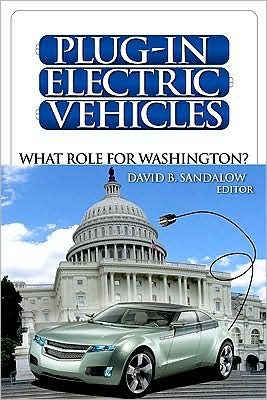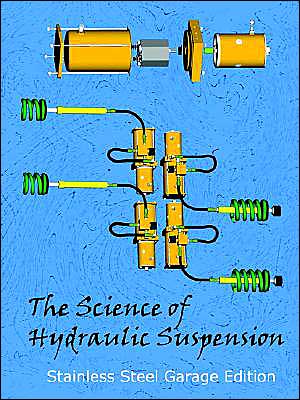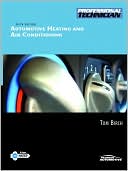Plug-In Electric Vehicles: What Role for Washington?
Plug-in electric vehicles are coming. Major automakers plan to commercialize their first models soon, while Israel and Denmark have ambitious plans to electrify large portions of their vehicle fleets. No technology has greater potential to end the United States' crippling dependence on oil, which leaves the nation vulnerable to price shocks, supply disruptions, environmental degradation, and national security threats including terrorism. What does the future hold for this critical technology,...
Search in google:
Last year, oil provided more than 96 percent of the energy in our cars and trucks. This overwhelming dependence empowers our enemies, imperils the planet, and strains family budgets whenever world oil prices rise. What can be done? The single most important answer may be promoting the widespread use of plug-in electric vehicles. This important book examines the role that the U.S. government can and should play in that mission. Most major automakers have announced plans to market plug-in electric vehicles, which can generally be recharged with a simple extension cord. What is the national interest in putting millions of these cars and trucks on the road soon? What should the federal government do to help make that happen? Can federal tax or procurement policy play a role? Can federal research and development help? At what point would subsidies for plug-in electric vehicles begin to match subsidies for oil? Answers to these questions and more emerge in this timely, innovative, and provocative volume.The editor of Plug-in Electric Vehicles is David B. Sandalow, an experienced expert in energy policy. His contributors include former government officials (e.g., former CIA Director James Woolsey), respected private sector analysts, NGO activists, and academic experts. Together they explain the current landscape for plug-in electrics and implications for national security, the environment, and the economy. They discuss what can and should be done to advance the role of plug-in electric vehicles."By far the most promising path to the trifecta of cleaner, cheaper, domestic fuel is through electrification of transportation. As modern battery technology has developed in response to themarkets for electronics, communications, power tools, and a host of other uses, it has brought with it opportunities to substitute electricity for oil products in transportation." -- Chapter 1, R. James Woolsey and Chelsea SextonContents BENEFITS1. The Geopolitics of Plug-Ins2. Electrification and Oil Displacement3. Pluggable Cars: A Key Component of a Low-Carbon Transportation Future4. The Cash Back CarBARRIERS5. Impact of Plug-In Hybrids on U.S. Oil Use and Greenhouse Gas Emissions6. Look Before You Leap POLICIES7. Current Federal Programs on Electric Vehicles8. Tax Credits for Electric Cars9. Federal Research and Development10. Federal Policy Options to Support Electric Vehicle Deployment11. Electric Vehicles: How Do We Get Millions on the Road?12. Electric Utility Issues in Replacing Oil with Electricity13. Advancing PHEVs via Utility Industry Battery Acquisition and Leasing
Foreword Strobe Talbott Talbott, StrobeCommentary Dan Reicher Reicher, DanIntroduction David Sandalow Sandalow, David 1Pt. 1 Benefits1 Geopolitical Implications of Plug-in Vehicles R. James Woolsey Woolsey, R. James Chelsea Sexton Sexton, Chelsea 112 Electrification of Transport and Oil Displacement: How Plug-Ins Could Lead to a 50 Percent Reduction in U.S. Demand for Oil Saurin D. Shah Shah, Saurin D. 223 Pluggable Cars: A Key Component of a Low-Carbon Transportation Future Deron Lovaas Lovaas, Deron Luke Tonachel Tonachel, Luke 454 The Cash Back Car Jon Wellinghoff Wellinghoff, Jon 65Pt. 2 Barriers5 The Impact of Plug-In Hybrids on U.S. Oil Use and Greenhouse Gas Emissions Alan L. Madian Madian, Alan L. Lisa A. Walsh Walsh, Lisa A. Kim D. Simpkins Simpkins, Kim D. 896 Look Before You Leap: Exploring the Implications of Advanced Vehicles for Import Dependence and Passenger Safety Irving Mintzer Mintzer, Irving 107Pt. 3 Policies7 Current Federal Authorized Programs on Plug-In Hybrids, Battery Electric Vehicles, and Related Efforts Dean Taylor Taylor, Dean 1338 Tax Credits for Electric Cars: Stimulating Demand through the Tax Code Benjamin H. Harris Harris, Benjamin H. 1569 Cost-Effectiveness of Greenhouse Gas Emission Reductions from Plug-in Hybrid Electric Vehicles Daniel M. Kammen Kammen, Daniel M. Samuel M. Arons Arons, Samuel M. Derek M. Lemoine Lemoine, Derek M. Holmes Hummel Hummel, Holmes 17010 Federal Policy Options to Support Early Electric Vehicle Deployment by Reducing Financial and Technological Risks Bracken Hendricks Hendricks, Bracken Benjamin Goldstein Goldstein, Benjamin 19211 Electric Vehicles: How Do WeGet Millions on the Road? Tom Z. Collina Collina, Tom Z. Ron Zucker Zucker, Ron 20812 Electric Utility Issues in Replacing Oil with Electricity in Transportation Steve Marshall Marshall, Steve 22313 Promoting Use of Plug-In Electric Vehicles through Utility Industry Acquisition and Leasing of Batteries Peter Fox-Penner Fox-Penner, Peter Dean Murphy Murphy, Dean Mariko Geronimo Geronimo, Mariko Matthew McCaffree McCaffree, Matthew 240Contributors 249Index 251








